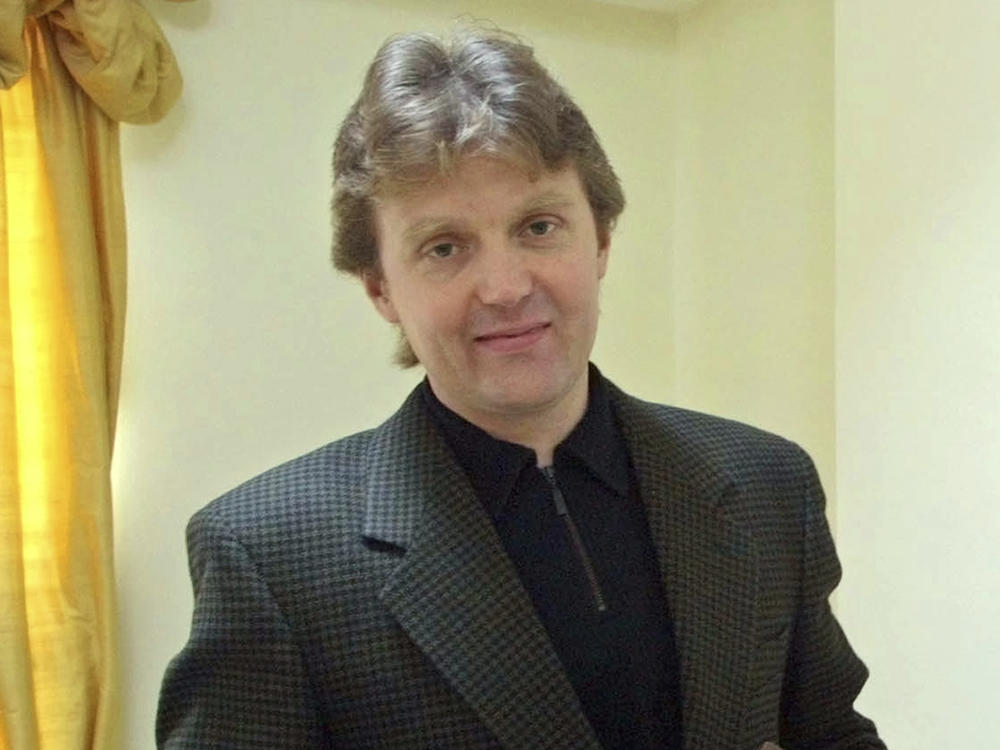Section Branding
Header Content
Russia Fatally Poisoned A Prominent Defector In London, A Court Concludes
Primary Content
Updated September 21, 2021 at 10:47 AM ET
The European Court of Human Rights has found the Kremlin responsible for the 2006 assassination by radiation poisoning of Alexander Litvinenko, a former Russian intelligence official who defected to the West.
Meanwhile, British police said Tuesday that they have identified a third suspect in a Russian-linked nerve agent attack on a former Russian double agent in southern England.
Litvinenko died in London weeks after drinking tea that was later found to have been laced with the deadly radioactive compound polonium-210.
In its ruling, the ECHR said it "cannot but conclude" that two Russian intelligence agents, Andrei Lugovoi and Dmitry Kovtun, had killed Litvinenko "acting as agents of the respondent State [Russia]."
However, the court rejected a claim for punitive damages by Litvinenko's widow, Marina, who brought the case.
The ECHR, also known as the Strasbourg court, is affiliated with the Council of Europe, which is distinct from the European Union.
The Kremlin has denied any involvement in Litvinenko's death, while Lugovoi and Kovtun have suggested that the defector may have poisoned himself. However, critics of Russian President Vladimir Putin, himself a former KGB officer, say Litvinenko's death is part of a deliberate policy to "liquidate" defectors.
On his deathbed, Litvinenko himself accused Putin of ordering his assassination.
The European court's decision is in line with the findings of a 2016 British inquiry into Litvinenko's death. It concluded that the FSB, the successor to the KGB, carried out the operation to kill him, which was "probably approved by Mr. [Nikolai] Patrushev, then head of the FSB, and also by President Putin."
New suspect named in the poisoning of a father and his daughter
British authorities on Tuesday also made a dramatic announcement in yet another high-profile case of a Russian-linked assassination plot on British soil. They named a third suspect in a plot three years ago to kill Sergei Skripal, a former agent of Russia's foreign intelligence branch, the SVR, and his daughter, Yulia.
After retiring, Skripal was arrested and convicted of working undercover for Britain's MI6. He spent several years in a Russian prison before arriving in the United Kingdom as part of a prisoner swap.
In March 2018, Skripal and Yulia were found unconscious on a park bench in Salisbury, southern England.
Authorities later said the Skripals had been poisoned with a nerve agent, Novichok, developed during the Cold War in a top-secret Russian laboratory. The two survived the attack.
British authorities, using surveillance video, later identified two Russian men, Alexander Petrov and Ruslan Boshirov, as suspects in the attack. Petrov and Boshirov, which London says are part of Russian military intelligence, known as the GRU, were later charged in absentia with conspiracy to murder and attempted murder.
Police say they now have enough evidence to charge a third man, Denis Sergeev, alias Sergei Fedotov, with plotting to kill the Skripals. They say Fedotov met several times with Petrov and Boshirov ahead of the operation and returned to Russia ahead of the other two suspects.
"The government will continue to respond extremely robustly to the enduring and significant threat from the Russian state," British Home Secretary Priti Patel told Parliament on Tuesday, according to Reuters. "We respect the people of Russia but we will do whatever it takes, everything it takes to keep our country safe."
Copyright 2021 NPR. To see more, visit https://www.npr.org.

